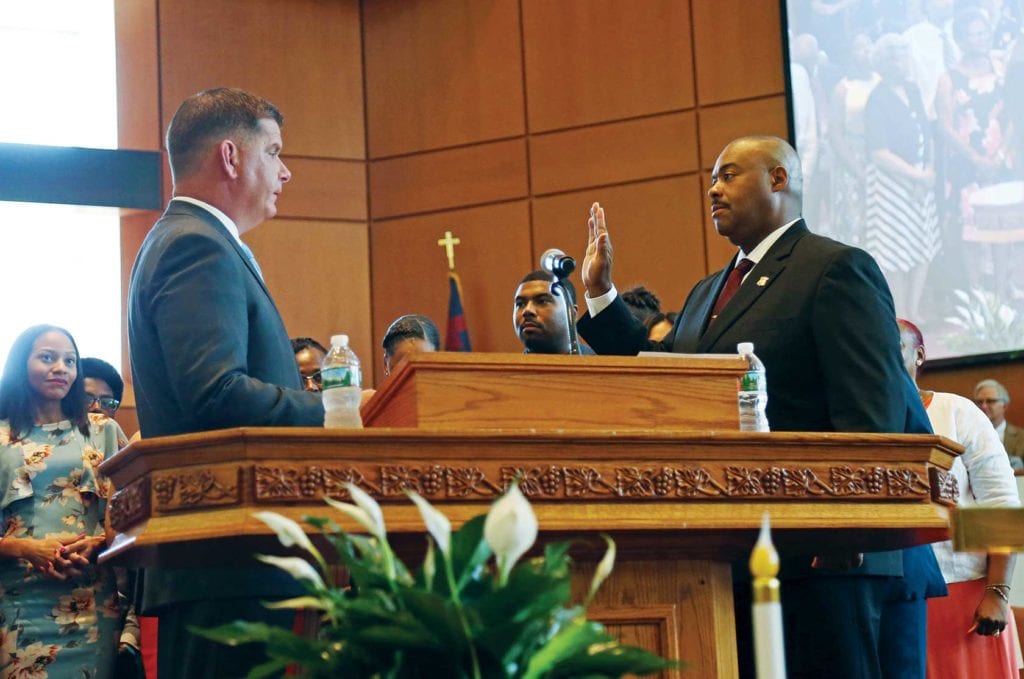Gross sworn in as city’s first black police commissioner
Pledges to strengthen department’s ties to community

Newly-appointed Boston Police Commissioner William Gross pledged to focus on enhancing community policing efforts, promoting diversity throughout the department, maintaining transparency and enhancing efforts to take care of officers’ mental health needs.

U.S. Rep. Michael Capuano, City Councilor Frank Baker, Massachusetts Treasurer Deborah Goldberg, Massachusetts Attorney General Maura Healey and Lt. Governor Karyn Polito. Photo: Mayor’s Office photo by John Wilcox
The four focus areas Gross outlined, during his swearing-in ceremony at Morningstar Baptist Church Monday, are part of what the new commissioner called “21st-century policing.”
“All this means is, we’ve learned from lessons of the past and we’re coming forward with open arms,” he said.
Gross was sworn in by Mayor Martin Walsh in a church packed with several hundred supporters including elected officials, clergy, community activists, four former Boston Police commissioners and scores of current and retired police officers.
The first African American to lead Boston’s police department, Gross spoke passionately about growing up in Dorchester and being watched over by neighbors and other community members when he was a teen. He praised departing Commissioner William Evans for his work on community policing and pledged to build on that work.
“We’re going to work together and strengthen the models we have,” he said, adding that the department is open to accepting constructive criticism.
Gross’ pledge to articulate a plan for diversity in the department comes after successive waves of new recruits entering the department have been overwhelmingly white. Further complicating matters, many of the top-ranking blacks in command staff positions have retired or are expecting to do so in the next few years, potentially draining the department of leadership of color.
Gross said the department has changed in the decades since he joined as a cadet in 1983.
“In 1983 if you ever told me I’d be here today, like, ‘No way,’” he said. “Not a glass ceiling, but a brick ceiling. Look how far we’ve come.”
On the topic of transparency, Gross said he would welcome suggestions from community members.
“We expect your input and we welcome it,” he said.
Explaining his final focus area, officer wellness, he emphasized that policing is a tough job and takes an emotional toll.
“First responders are not robots,” he said.
Community ties
Walsh expressed confidence that Gross will build on the work of departing Commissioner William Evans to forge better ties with communities and implement better training and technology in the department.
“He will build on a record that has made neighborhoods safer,” Walsh said. “Here in Boston we are about lifting people up, not locking people up.”
During his remarks, Gross thanked the former superintendents in attendance — Kathleen O’Toole, Paul Evans, Ed Davis and William Evans. He acknowledged the presence of teenagers from the Dorchester YMCA and the Center for Teen Empowerment, before concluding his remarks.
He also thanked the elders in the audience, recalling how elders on the Esmond Street block where he grew up looked out for him and other children.
“I am the product of a community that helped me become a Boston police cadet in 1983,” he said.







